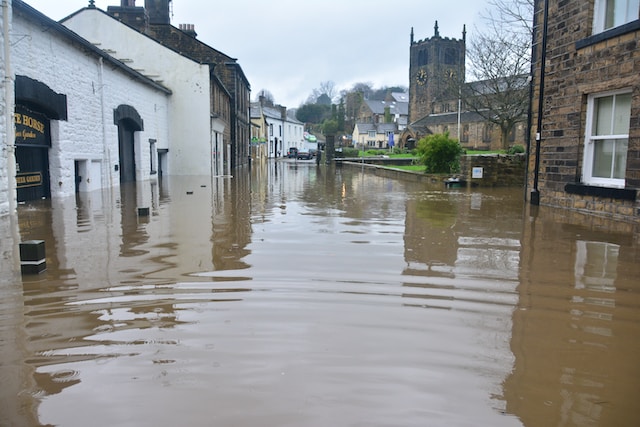Social Impacts of Flooding

Flooding does not only result in destroyed infrastructure and damaged property, but also has negative effects on citizens affected by the disaster. Impacts on physical and mental health can be both short-term and long-term and can result in changes to the livelihoods of affected citizens [i]. Further, the social repercussions of flooding have impacts on individuals and families that can be felt in other areas of work and life. Therefore, addressing the psychological and social impacts of flooding is important for support and recovery efforts after a flood occurs.
Direct impact
Health (Physical and Mental)
The impacts of flooding on physical and mental health can be extensive. Drowning accounts for 75% of deaths in flood disasters. Further consequences arise from water or vector-borne disease (e.g. cholera, malaria), injuries sustained as a result of the flood, loss of medical care due to disrupted medical infrastructure, etc. [ii]. Canada typically does not have many flood-related deaths but deaths can be far greater in other countries [iii]. Alberta’s June 2013 flood is generally linked to five deaths [iv], while many more people were left grappling with emotional consequences, stress, and anxiety.
Flood waters are often contaminated with debris, pollutants and sometimes even sewage that pose the potential for serious injury or death for those who come into contact [v] with the water. For example, after the 1998 and 2000 floods in England, an increase in gastrointestinal and respiratory illnesses was documented [vi]. Furthermore, fast moving and murky water can create additional dangers that cannot be seen, such as sinkholes, moved manhole covers, and sharp objects. Thus, the risks to one’s physical health are always present until flood waters have receded and clean-up efforts have begun. Due diligence and safety measures are required before, during, and after a flood to protect individuals from being impacted.
The stress of dealing with a traumatic event can worsen pre-existing health conditions and lead to a variety of illnesses that continue to impact lives long after flood waters have receded. A study in the United Kingdom found that people who experienced flood and storm damage to their homes were more likely to experience poorer mental health [vii]. The stress of returning a home to pre-flood conditions can be intensified if the individual has negative experiences with insurers or builders [viii]. Acute stress, clinical depression, anxiety, and post-traumatic stress disorder (PTSD) are all associated with flooding, and the intensity of response can depend on the severity of the flood. A 2022 Canadian study found that psychosocial effects of flooding included family discord, isolation and financial strain and worsened existing disorders [ix].
Cultural Events and Discoveries/ Recreation
Flooding can lead to significant loss of cultural heritage although attaching numbers to those losses is difficult. This is because of factors such as the lack of awareness of cultural and heritage items, the difficulty in attaching a value (market and non-market) to those items and failing to estimate the true extent of the loss in the immediate aftermath of a flood [x].
However, flooding may also result in focussed research at sites considered to be at high risk after the flood which may result in longer term benefits [xi]. Also, once flood waters recede and citizens return to recreational activities, artifacts uncovered by the flood waters can be found. For example, in the days after the June 2013 floods in southern Alberta, reports emerged of new dinosaur fossil discoveries [xii]. These findings have contributed to Alberta’s heritage and remains a positive impact of the June 2013 floods.
Long-term impact
Over time, the long term effects of flooding become more obvious [xiii]. Citizens can become impatient and unsatisfied with decision-makers in provincial and municipal government, as well as insurance companies and other service providers. This dissatisfaction can manifest and result in negative political implications for decision-makers. Anniversaries of the flood or subsequent heavy rainfall events can lead some residents to experience increased stress levels. Those recovering from a flood may later question whether they would again attempt to recover after another flood. Even over a decade after experiencing flooding, those affected are the most likely to worry about the consequences of future flooding and question their ability to recover [xiv] again. This concern has implications for the community’s trust in the abilities of the local risk management agencies.
Sources:
[i] Associated Programme on Flood Management. (2013). What are the negative social impacts of flooding? https://www.floodmanagement.info/what-are-the-negative-social-impacts-of-flooding/. Accessed 2023-05-25.
[ii] World Health Organisation, n.d., Floods. https://www.who.int/health-topics/floods/#tab=tab_2. Accessed 2023-05-25.
[iii] Hamidifar, H. & Nones, M., 2021, Global to regional overview of floods fatality: the 1951-2020 period. https://nhess.copernicus.org/preprints/nhess-2021-357/nhess-2021-357.pdf. Accessed 2023-05-26.
[iv] Canadian Broadcasting Corporation, 2014, Alberta Flood 2013: The five people we lost. https://www.cbc.ca/calgary/features/albertaflood2013/alberta-flood-deaths/. Accessed 2023-05-26.
[v] Alberta Health Services, 2013, Flood Water Precautions. https://albertahealthservices.ca/assets/wf/eph/wf-eh-flood-water-precautions.pdf. Accessed 2023-05-25.
[vi] Werritty, A., et al, 2007, Exploring the Social Impacts of Flood Risk and Flooding in Scotland. https://discovery.dundee.ac.uk/en/publications/exploring-the-social-impacts-of-flood-risk-and-flooding-in-scotla. Accessed 2023-05-25.
[vii] Graham, H. et al, 2019, Flood- and Weather-Damaged Homes and Mental Health: An Analysis Using England’s Mental Health Survey. https://doi.org/10.3390/ijerph16183256. Accessed 2023-05-25.
[viii] Convery, I. & Bailey, C., 2008, After the flood: the health and social consequences of the 2005 Carlisle flood event. https://onlinelibrary.wiley.com/doi/epdf/10.1111/j.1753-318X.2008.00012.x. Accessed 2023-05-26.
[ix] Glenn, N. & Myre, M., 2022, Post-flooding community-level psychosocial impacts and priorities in Canada: A preliminary report. https://ncceh.ca/documents/evidence-review/post-flooding-community-level-psychosocial-impacts-and-priorities-canada. Accessed 2023-05-25.
[x] Bubeck, P, et al, 2017, Societal Impacts of Flood Hazards. https://doi.org/10.1093/acrefore/9780199389407.013.281. Accessed 2023-05-25.
[xi] Peck, T.R., 2017, Alberta’s culture-historical model and the Southern Alberta Flood
Investigation Program. https://open.alberta.ca/publications/after-the-flood-albertas-culture-historical-model. Accessed 2023-05-25.
[xii] Canadian Press, 2013, Alberta is dinosaur galore: as flood waters recede, scientists urge public to keep eyes peeled for fossils. https://nationalpost.com/news/canada/alberta-is-dinosaur-galore-as-floodwaters-recede-scientists-urge-public-to-keep-eyes-peeled-for-fossils. Accessed 2023-05-26.
[xiii] Currie, M., et al, 2020, Long-term impacts of flooding following the winter 2015/16 flooding in North East Scotland: Summary Report. CRW2016_02. Scotland’s Centre of Expertise for Waters (CREW). https://www.crew.ac.uk/sites/www.crew.ac.uk/files/sites/default/files/publication/CRW2016_02_Summary_Report_1.pdf. Accessed 2023-05-026.
[xiv] Twiddy, M., et al, 2022, Understanding the long-term impact of flooding on the wellbeing of residents: a mixed methods study. https://journals.plos.org/plosone/article?id=10.1371/journal.pone.0274890. Accessed 2023-05-26.
